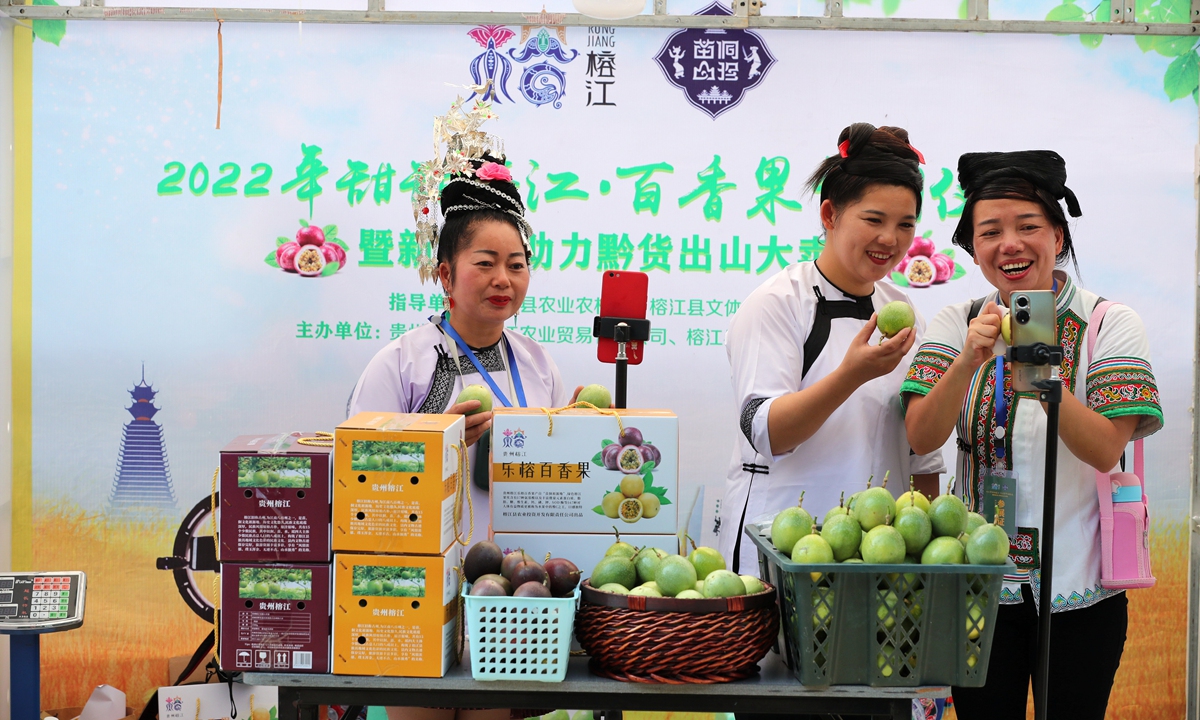
Farmers sell passion fruits through live-streaming platforms in Qiandongnan Miao and Dong Autonomous Prefecture, Southwest China’s Guizhou Province, on August 10, 2022. It has become increasingly popular in China to sell agricultural products through live-streaming platforms, and e-commerce is extending further into rural areas to help farmers increase their incomes. Photo: VCG
With the help of e-commerce platforms, a county in Northwest China's Shaanxi Province is now selling its famous jujubes nationwide, supplying a strong boost to the local agriculture sector.
Qingjian, a county on the Loess Plateau, has grown jujube trees for more than 3,000 years, with the planting area now totaling 60,000 hectares.
A pillar of the local economy, the jujube industry hit headwinds in recent years. For a long time, jujubes were sold at low prices as primary commodities on the wholesale market, with the profit declining due to intensified competition.
Today, the country's booming e-commerce industry is helping Qingjian turn headwinds into tailwinds. In 2021, as part of an initiative by e-commerce giant Alibaba Group to promote rural revitalization, Liang Yu was sent as a representative of the Alibaba Foundation to Qingjian to help sell local agricultural products on e-commerce platforms.
In July last year, a type of fruit preserve called amethyst jujube grabbed Liang's attention during his visits to some local households.
"Made from fresh jujube, it looks like amethyst and tastes sweet. It is also rich in nutrients. The locals were then struggling to find ways to market the product and sell it to a larger market, so I decided to use Alibaba's e-commerce platforms and transform this traditional food into a popular snack," Liang said.
Liang worked with local producers of amethyst jujubes to upgrade the product's flavor, packaging and sales mode.
"We have improved the production methods, redesigned the packaging, and actively participated in marketing campaigns by the e-commerce platforms, thus getting more online consumers to know about amethyst jujubes," he said.
Since October 2022, Alibaba platforms have seen 200,000 orders placed each month for amethyst jujubes.
Qingjian has been supporting the development of rural e-commerce in a variety of ways, including setting up a logistics center, providing training, and subsidizing express delivery services, according to Huang Haisheng, head of the county's e-commerce services center.
"Now with support from e-commerce platforms, we feel even more confident about future growth," Huang said.
In 2021, the country's online retail sales of agricultural products grew 2.8 percent year-on-year to reach 422.1 billion yuan ($60.52 billion), according to a report on e-commerce in China released by the Ministry of Commerce.
To further boost farmers' income, the positive role of digital technology in rural revitalization should be brought into full play, said Hong Yong, an expert in e-commerce with the Chinese Academy of International Trade and Economic Cooperation.
Data should become a "new fertilizer" in agriculture to drive up the output and profit, Hong added.
Xinhua



